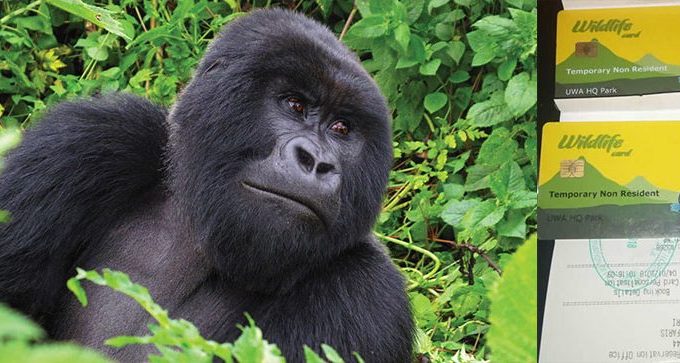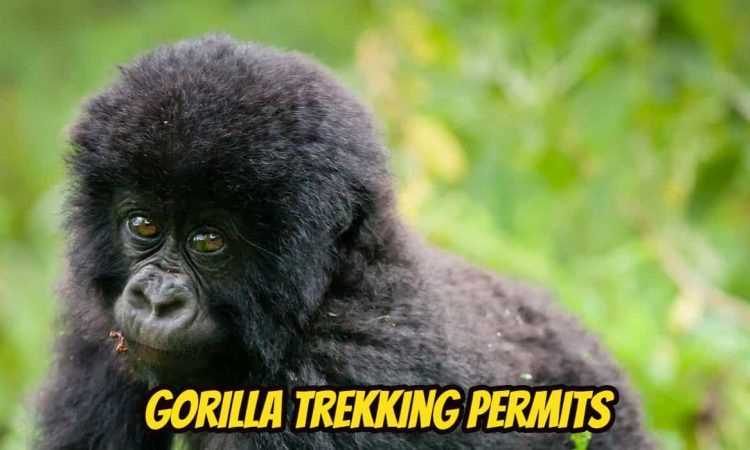
How To Get Gorilla Trekking Permits?
How To Get Gorilla Trekking Permits?
To take part in gorilla trekking in Uganda, Rwanda and the DR.Congo, a gorilla permit is required. It is not possible to track mountain gorillas without a gorilla permit, and the whole experience is highly regulated and strictly enforced.
The cost of a gorilla permit for foreign non-resident is currently USD $1,500 in Rwanda, USD $800 in Uganda and USD $400 in the DRC USD$ 400. This fee includes park entrance, and all guiding and tracking services provided by the park, not by individual operators. This fee does not include an optional porter to carry your day pack.
Note: It is important to know that gorilla permits are very scarce and their availability is very limited by the number of visitors allowed per family.
- Rwanda’s Volcanoes National Park ha 12 habituated gorilla families open for gorilla trekking experience, there is a maximum of eight visitors per day (not including guides and porters), which means a maximum availability of 96 permits per day.
- In Uganda’s Bwindi Impenetrable National Park and Mgahinga Gorilla National Park, there are 23 habituated gorilla families and a maximum of eight visitors per group, there are a total of just 184 permits available per day.
Gorilla permits can sell out months in advance, so if you are traveling during peak season you must book well ahead.
How to book gorilla trekking permits
Aside from the different in price, there are a few small differences between the gorilla permit systems in Rwanda and Uganda. Here is what you need to know:
Gorilla Trekking Permits in Rwanda
Gorilla permits in Rwanda are USD $1,500 per person, which is nearly twice the costs as in neighboring Uganda. The tourism authorities here have made a deliberate effort to orient the country towards more exclusive, higher-spending, and lower volume tourism and the permit price reflects that strategy.
Paradoxically, in Rwanda (unlike in Uganda) it is possible to organize a DIY gorilla trek by purchasing a permit directly from the Rwandan Development Board and then booking your own accommodation and transportation. Most lodges and hotels also take direct bookings, and they may also be able to organize your transfer to/from the airport and to the park entrance on the morning of your trek.
Depending on how intrepid you are feeling you can rent a car in Kigali to get yourself around, or even travel on public transport (factor in likely delays to your Rwanda Safari Itinerary).

If you do decide to travel independently, arrive at Volcanoes National Park a day early because if you are late, that is it, you will miss your permit and you won’t get your money back.
Because permits are limited and non-transferable, if you have got your heart set on a particular lodge, it’s prudent to check availability first, then book your permit, and then confirm your accommodation booking.
Alternatively, you can book the entire thing through a tour operator. They will arrange your gorilla trekking permit, book your accommodation and organize all the necessary logistics. The best thing to do is to book with tour operator. Rwanda is an easy place to travel around but things can go wrong and their support can be invaluable.
Gorilla Trekking Permits in Uganda
At USD $800 per person, gorilla permits in Uganda are far from cheap but still more accessible than in neighboring Rwanda. For an extended gorilla experience, gorilla habituation experience permit allows approximately four hours with the gorillas, rangers and researchers costing $1,500.
As an incentive to explore less-visited corners of Uganda, gorilla permit holders are entitled to a day’s free entrance to either Mount Elgon National Park in eastern Uganda or Toro-Semliki Wildlife Reserve in Western Uganda. This fee doesn’t cover activity fees, only the park entrance.
Even though Uganda has nearly twice as many gorilla permits available, they still set out quickly. Rwanda doubling its price of their gorilla tracking permits has been to drive up demand of permits in Uganda.
Unlike in Rwanda, in Uganda – international visitors must buy gorilla permits via a tour operator. Only Ugandan residents can buy permits directly from the Uganda Wildlife Authority Office in Kampala.
Everything to Know Before Booking a Gorilla Trekking Permit
If you plan to travel during peak season or if you are in large group, you should book your permit as well as safari six months or even a year in advance. Peak seasons are June to October and Christmas and the New Year. The earlier you book the more choice you have on where you stay and where you track. Last minute bookings may be possible during low season or with smaller groups that there are no last-minute discounts, so don’t risk it.
Each gorilla permit is printed with a unique serial number and the traveler’s personal details. You will need to provide your passport when you book your permits and you will need to show this at the start of your gorilla tracking activity too.
In case you need to postpone your gorilla trip and have booked through a tour operator they may be able to liaise with the authorities to transfer your permit to another traveler and book you a fresh permit. If you need to cancel, the authorities may refund some of your fee depending on how close you are to the trek date.
Note: Make sure you have got travel insurance from the moment you purchase your permit.
Is seeing mountain gorillas guaranteed – with over 10 years of organizing gorilla treks, it is a rare occurrence that visitors have not encountered mountain gorillas on their trek in Uganda and Rwanda. However, if it happens visitors are given a complimentary permit to track again the next day. Since gorillas are monitored by GPS, tracking mountain gorillas has become more thorough so you can safely assume that you will see the gorillas, although it is not officially guaranteed.
In conclusion about the gorilla permit system. Although they are costly, don’t forget they are a main source of funding for gorilla conservation and projects that benefit local communities. Uganda and Rwanda have made huge strides in restoring and protecting key habitats. Gorilla conservation is one of the most successful stories that deserve to be celebrated.
